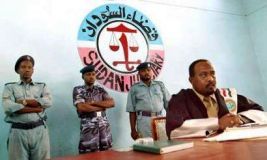Sudan: No justice for Darfur victims
June 8, 2006 (NEW YORK) — The courts established by the Sudanese government to deal with the widespread crimes in Darfur have failed to provide justice to victims of war crimes committed since early 2003, Human Rights Watch said in a briefing paper released today.
 On June 6, 2005, the Office of the Prosecutor for the International Criminal Court (ICC) announced it had opened an investigation into the events in Darfur. The next day Sudan’s chief justice announced the establishment of the Special Criminal Courts on the Events in Darfur (SCCED), telling the Sudanese media that the court was “considered a substitute to the international criminal court.”
On June 6, 2005, the Office of the Prosecutor for the International Criminal Court (ICC) announced it had opened an investigation into the events in Darfur. The next day Sudan’s chief justice announced the establishment of the Special Criminal Courts on the Events in Darfur (SCCED), telling the Sudanese media that the court was “considered a substitute to the international criminal court.”
“The cases before the court so far involve ordinary crimes like theft and receiving stolen goods, which don’t begin to reflect the massive scale of destruction in Darfur,” said Sara Darehshori, senior counsel to the International Justice Program at Human Rights Watch and author of the briefing paper. “The Sudanese government must do more than pay lip service to the idea of justice.”
Since early 2003, tens of thousands of civilians have been assaulted, raped and killed, hundreds of villages destroyed and approximately 2 million people forcibly displaced by the conflict. Human Rights Watch is aware of only 13 cases that have been brought before the new special court to date. The cases have involved low-ranking individuals accused of relatively minor offences. No senior commanders or superiors have been charged for their part in the atrocities.
In its 31-page briefing paper, Human Rights Watch examines the first year of the special court’s operations, and sets out the major roadblocks to the prosecution of war crimes in Darfur. These include:
A lack of clarity in Sudanese law on which war crimes and crimes against humanity can be prosecuted;
Absence of a legal basis to hold commanders accountable on the basis of “command responsibility” for crimes they may have failed to prevent or punish;
Provisions granting immunity from prosecution to members of the armed forces, national security agencies and police that create potential obstacles to successful prosecution;
The incorporation of many of the “Janjaweed” militia into the Popular Defense Force, special police forces and other paramilitary groups, possibly enabling them to invoke immunity to avoid prosecution;
Failure to investigate complaints by victims; and
Victims – particularly those of gender-based sexual violence – often being harassed and sometimes threatened with arrest or prosecution themselves when they go to the police.
“The 13 cases brought so far are an insult to the victims,” said Darehshori. “The failure of the justice system in Darfur makes ICC prosecutions all the more important. Khartoum must now cooperate fully with the ICC investigations.”
The Human Rights Watch briefing paper, “Lack of Conviction: The Special Criminal Court on the Events in Darfur,” is available at:
http://hrw.org/backgrounder/ij/sudan0606/
(HRW)
